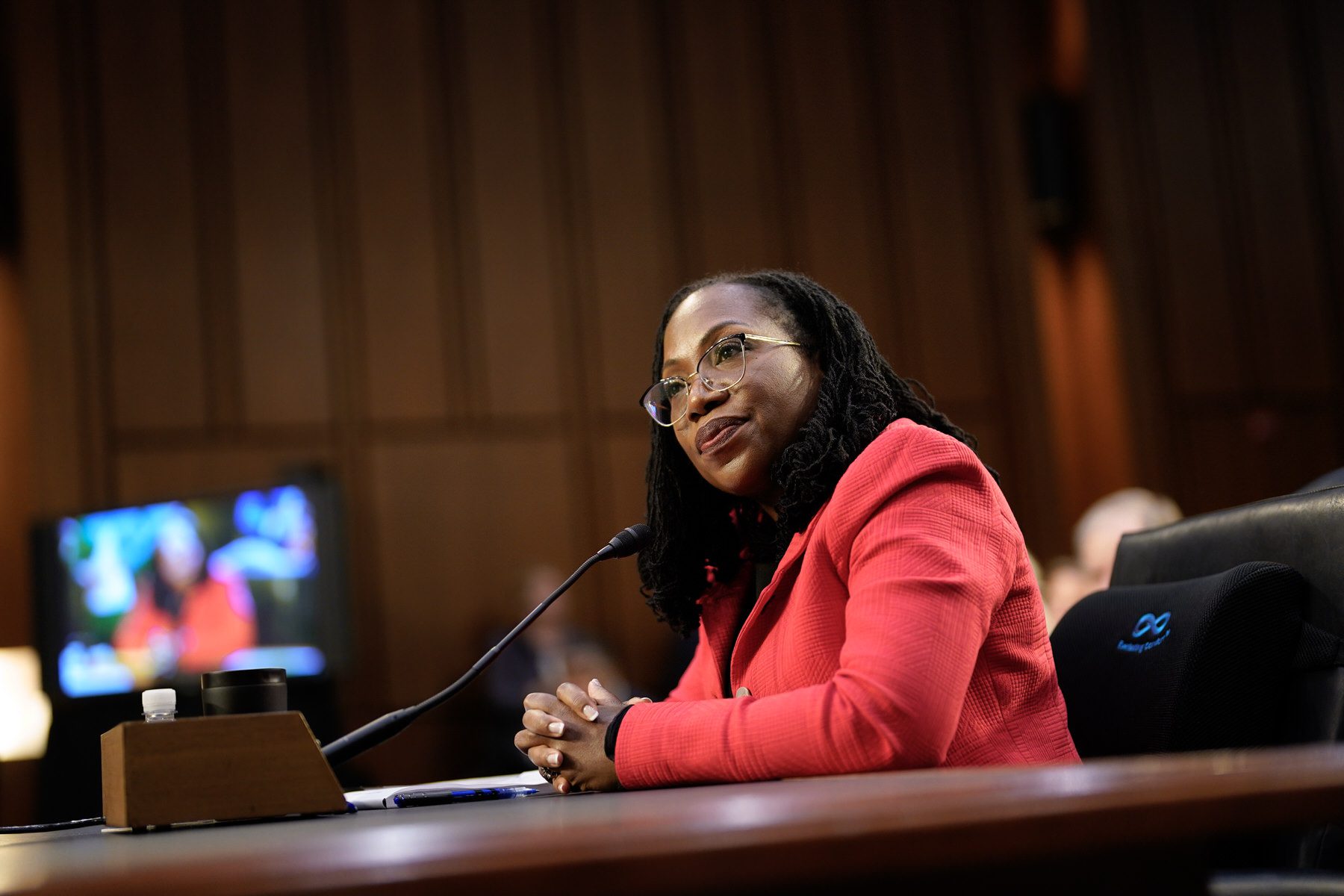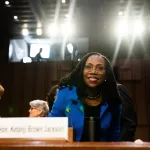To many Black women, her seven-second pause spoke volumes.
Judge Ketanji Brown Jackson, the first Black woman nominated to the U.S. Supreme Court, had just been asked by Republican Sen. Ted Cruz of Texas whether she believes babies are racist. “Senator,” Jackson responded through an audible sigh, followed by several moments of silence. “I do not believe that any child should be made to feel as though they are racist, or though they are not valued, or though they are less than,” she continued.
It was one of several instances throughout Jackson’s four-day Senate confirmation hearings this week when her presence reflected a reality that is noticeably underrepresented on the nation’s highest court. Black women law professors told The 19th that the hearings brought back memories of their own experiences navigating workplaces and advocating for themselves without speaking too harshly for fear of being labeled as angry or sensitive. Jackson was largely composed, but she showed clear moments of frustration when she pushed back on Republican criticism. She also cried at two points when Democratic senators championed her record. For the law professors, the spectrum of emotions Jackson displayed highlights the effort of many Black women to find a balance.
“Obviously, it’s not on that same sort of public stage, but you’re the one having to keep your composure and be firm but respectful,” said Kimberly Mutcherson, co-dean and professor at Rutgers Law School in Camden, New Jersey. “So, watching that happen to somebody else is a real reminder of how difficult it is to live this life and do this work.”
“You do all the things that you’re supposed to do, you go to the right schools, and still you can be treated like somebody who is an interloper, and who has no right to sit in the seat that she’s getting,” she continued.
Since the announcement of Jackson’s nomination on February 25, the White House and her allies have cast her as a nominee who is both accomplished and can relate a range of life experiences. Jackson’s parents grew up in the Jim Crow era, attended historically Black colleges and went on to work in public education. A commitment to public service is part of her family values, Jackson has said. After graduating from Harvard with bachelor’s and law degrees, Jackson worked in private practice and in government as a federal public defender and as vice chair for the bipartisan U.S. Sentencing Commission.
-
More from The 19th
- Pride, joy, inspiration, validation: What Black women see in Ketanji Brown Jackson’s nomination
- Four Black women became classmates, roommates and lifelong sisters. One of them is now a historic nominee for the Supreme Court.
- The 19th Explains: What to know about Ketanji Brown Jackson’s Supreme Court confirmation hearing
Her experiences, particularly as a defender and on the Sentencing Commission, have informed her work as a judge, she said. Jackson has said that as a federal trial court judge she makes an effort to explain criminal proceedings to the defendants before her, as well as the harm their crimes have caused.
The hearings highlighted that work, as well as revealed how Jackson’s experience speaks to underrepresented groups, including professional Black women finding ways to navigate industries dominated by White men. Jackson faced periods of tense questioning from Republican senators who were unsatisfied with her judicial philosophy, attempted to tie her to critical race theory, and repeated misleading claims about her sentencing record in several child sexual abuse cases.
Much of those questions, focused on crime rates, school curricula and religious liberty, reflect popular GOP talking points for this year’s midterm elections. But the political motivations cannot be untethered from their racial implications, said Angela Onwuachi-Willig, dean of the Boston University School of Law.
Republicans “are speaking to their base, and Judge Jackson’s race and gender are very much a part of how they are speaking to their base,” Onwuachi-Willig said, adding that connecting Jackson to crime and critical race theory “is in many ways a dog whistle” that has been used for years to signal who is or is not accepted by the party.
Coded language and more explicit questions about race are not new for Black judicial nominees. During the 1967 hearings for Thurgood Marshall, the country’s first Black Supreme Court justice, a senator asked whether he was prejudiced against White people in the South. Last summer, during Jackson’s confirmation process to the Washington, D.C., appellate court, she was asked about the role that race plays in the type of judge she would be.
During this week’s hearing, Republicans have painted Jackson as soft on crime, though a number of high-profile conservatives and law enforcement organizations have endorsed her nomination. She was asked whether she applies critical race theory in her work as a judge and her views on journalistic work about American slavery.
Jackson largely remained composed when pressed for responses related to critical race theory and her approach to criminal defendants. She said that she does not use critical race theory in her work as a judge and attempted to explain the complicated factors that go into criminal sentencing and assure the senators that she makes every effort to be unbiased. Jackson’s position this week, though unique and history-making, mirrors a playbook many Black women have had to adopt to appear stoic and non-threatening when challenged, said Tiffany Atkins, an assistant professor of Law at Elon University.
“We know the code. You have to comport yourself in a certain way when you are a Black woman in certain spaces,” Atkins said.
Still, Jackson let her frustration show at points and pushed back against Republicans characterizations of her work. At one point Wednesday, Republican Sen. Josh Hawley of Missouri asked again about her sentencing decision in child sexual abuse cases. When questioned whether she regretted sentencing one defendant to three months, Jackson responded: “What I regret is that in a hearing about my qualifications to be a justice on the Supreme Court, we have spent a lot of time focusing on this small subset of my sentences.”
When Hawley pressed further, Jackson said, “Senator, I’ve answered this question and I will stand on what I already answered.”
By holding firms in these moments, Jackson showed her experience as an attorney, trial court judge and as someone who has sat before the Senate for three prior confirmation hearings.
“It’s really reflective of the kinds of tools that those of us who are successful Black women working in largely White and largely male environments have to really cultivate for ourselves,” Mutcherson said. “There are certain things where I will just let them roll off my back because it’s not worth it to try to engage. Then there are times when I say, ‘Some things you’re just not going to say to me.’”
Later that day, Jackson received a bit of respite from Sens. Cory Booker of New Jersey and Alex Padilla of California, who are both Democrats and men of color. Jackson began to cry when Booker praised her accomplishment and noted the obstacles she’s had to overcome. In a way, it was a safe space where Jackson could be emotional with people who could understand her, particularly given that there are no Black women in the Senate.
“Don’t worry, my sister. Don’t worry. God has got you,” Booker told Jackson. Tears came again when Padilla asked Jackson what she would say to young people who may doubt what they can achieve. Jackson recounted a story of first arriving at Harvard University as a freshman and feeling out of place. She explained that she passed by another Black woman on campus she didn’t know who suddenly leaned over and told her to “persevere.” That, too, is her advice to young people, Jackson said to Padilla.
Onwuachi-Willig saw it as a moment of vulnerability, challenging another stereotype of Black women needing to be strong or “superwomen” all the time.
“We don’t only get judged by our actions as individuals, all Black people get judged by our actions,” she said. “That’s an enormous weight. Judge Jackson was carrying that weight for hours and hours and hours, and I felt that was a human moment.”






